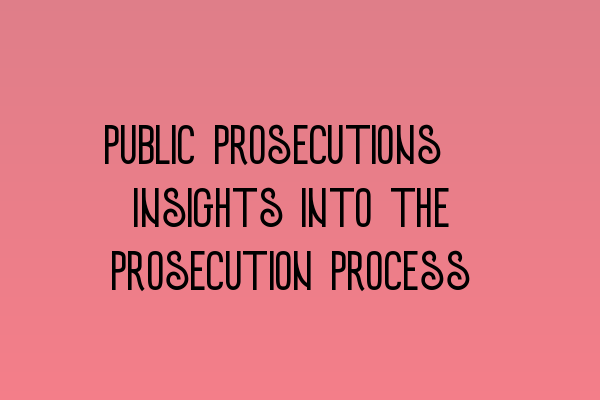Public Prosecutions: Insights into the Prosecution Process
Welcome to our blog post, where we will provide you with valuable insights into the prosecution process.
Understanding the Prosecution Process
The prosecution process plays a crucial role in the criminal justice system. It involves the legal representation of the state or the Crown in bringing charges against individuals or organizations accused of committing crimes. This process aims to ensure that justice is served and that the guilty parties are held accountable for their actions.
When a crime has been committed, the police will investigate the matter and gather evidence. If the evidence supports a reasonable belief that a crime has been committed and there is enough evidence to prosecute, they will refer the case to the Crown Prosecution Service (CPS).
The CPS is responsible for reviewing the evidence and deciding whether there is a realistic prospect of conviction. They consider the public interest in pursuing the prosecution and determine whether it is in the best interest of justice to proceed with the case. If the decision is made to proceed, the CPS will then initiate the prosecution process by issuing charges against the accused.
The Role of the Prosecution
The prosecution’s role is to present the evidence and arguments in court, in order to prove the guilt of the accused. They are responsible for ensuring that all relevant evidence is disclosed to the defense, and they must act ethically, ensuring that they disclose any evidence that may undermine their case.
During the trial, the prosecution will call witnesses, present evidence, and cross-examine the defense’s witnesses. Their goal is to establish beyond a reasonable doubt that the accused is guilty of the charges laid against them. The prosecution must adhere to legal principles and rules of evidence, ensuring that all proceedings are fair and just.
The Importance of Skilled Prosecution
Having skilled prosecutors is essential for a fair and effective criminal justice system. Prosecutors must possess excellent legal knowledge, strong advocacy skills, and a thorough understanding of the law. Their ability to present a compelling case and challenge the defense’s arguments can significantly impact the outcome of a trial.
At SQE Criminal Law & Practice Law UK, we recognize the importance of quality legal education and training for aspiring prosecutors. Our SQE 1 Preparation Courses and SQE 2 Preparation Courses equip students with the necessary skills and knowledge to excel in the field of criminal law. We also offer SRA SQE Exam Dates to help candidates plan their study and exam schedules effectively.
For those preparing for the SQE exams, it’s crucial to practice and assess their knowledge. Our SQE 1 Practice Exam Questions and SQE 1 Practice Mocks FLK1 FLK2 are valuable resources that provide realistic exam scenarios and help develop confidence.
Conclusion
The prosecution process is integral to the criminal justice system, ensuring that crimes are prosecuted and justice is served. Skilled prosecutors play a crucial role in presenting compelling cases and upholding the principles of justice. To excel in this field, it is essential to receive quality legal education and training.
Visit SQE Criminal Law & Practice Law UK to explore our range of courses and resources to support your journey in becoming a proficient prosecutor.
